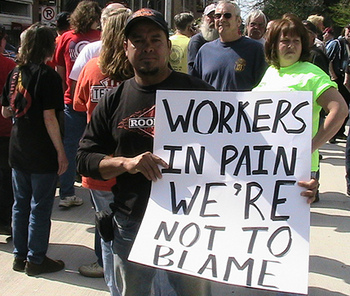By Ralph De La Cruz
Florida Center for Investigative Reporting
Among the first things to go when times get tough are good intentions.
For almost two decades, American companies worked to bring under-represented Hispanic and black workers into their workplaces. With labels like, “Our commitment to diversity,” they told us that it made economic sense to have the workforce reflect the population. Particularly in a nation where minorities are heading toward majority status.
 Then came one big, bad recession and … well, have you noticed you don’t hear much about affirmative action anymore? Or how blacks, Latinos and women are moving up at the expense of white men? There are no big make-a-statement state initiatives about banning race as a consideration for hiring.
Then came one big, bad recession and … well, have you noticed you don’t hear much about affirmative action anymore? Or how blacks, Latinos and women are moving up at the expense of white men? There are no big make-a-statement state initiatives about banning race as a consideration for hiring.
That’s because the Great Recession has brought about what I call affirmative reaction, the rollback of gains made by blacks and Latinos in the workplace.
Economists peg the Great Recession as starting in December 2007. Earlier that year, in February, National Public Radio was running a story about how black unemployment had finally dipped for the first time in five years.
By January of this year, the Washington Post was reporting: “Unemployment for African Americans is projected to reach a 25-year high this year.”
Latinos haven’t fared any better.
“Latino workers are over-represented in the sectors that contracted the most during the recession, including the construction industry,” read a May report by the Joint Economic Committee of the U.S. Congress.
The report points out that the year before the start of the Great Recession, “the gap between the Hispanic unemployment rate (4.9 percent) and the overall unemployment rate (4.6 percent) reached a record low of 0.3 percentage points.”
By March of this year, Latino unemployment was 12.6 percent, almost three percentage points higher than the overall unemployment rate (9.7) at the time.
The story is even worse in states with large Latino communities, such as Florida. Florida International University’s Research Institue on Social & Economic Policy reports that, since the beginning of the recession, the unemployment rate for blacks in Florida has gone up by almost 10 percentage points. And for Latinos, it’s gone up by 7.4 percentage points. For white Florida workers, the unemployment rate increased by 5.1 percent since the recession started.
The RISEP report also reminds us that respected economic analysts Moody’s Economy predicts things will get even worse for black and Latino workers in Florida through the end of the year.
Nationally, the October assessment by the U.S. Bureau of Labor Statistics reads: “Among the major worker groups, the unemployment rate for adult men (9.8 percent), adult women (8.0 percent), teenagers (26.0 percent), whites (8.7 percent), blacks (16.1 percent), and Hispanics (12.4 percent) showed little or no change in September.”
Twenty-six percent, 16.1 and 12.4? Plenty of reason for young, black and Latino voters to be disillusioned this election.
A disillusionment that’s not likely to go away with another appearance by President Barack Obama on The Daily Show, MTV or BET.
